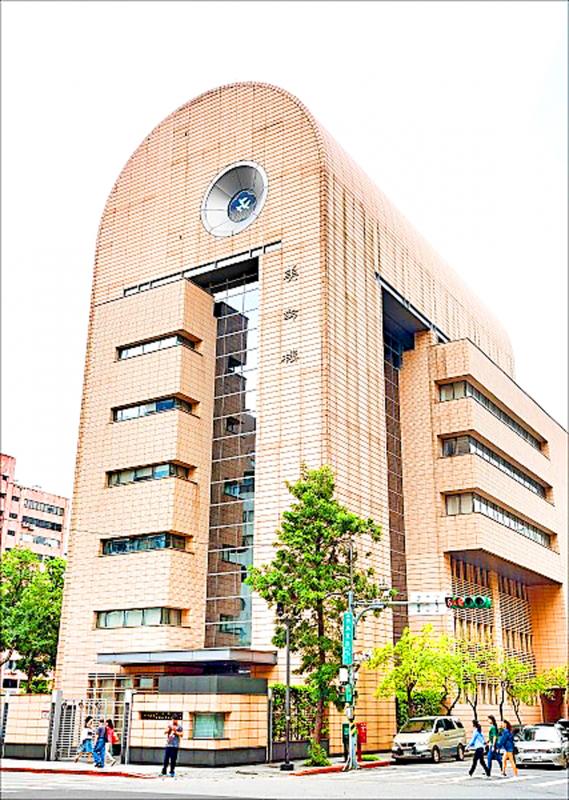The dissolution of the National Women’s League was made official yesterday with a document from the Ministry of Interior (MOI).
The ministry ordered the dissolution because the league refused to transform into a political party in accordance with the the Political Parties Act (政黨法) before a government deadline.
The league was founded in 1950 by Chiang Kai-shek’s (蔣介石) wife, Soong Mayling (宋美齡), to provide care for military families.

Photo: Chen Yu-fu, Taipei Times
According to the act, which took effect on Dec. 6, 2017, all political groups had to revise their charters and transform into political parties within two years following the promulgation of the regulations.
The deadline had been due to expire on Dec. 6 last year, but the ministry extended it for four months to allow the league to make preparations, Deputy Minister of Interior Hua Ching-chun (花敬群) said.
However, as it refused to comply, the ministry was forced to order its dissolution, Hua said.
National Women’s League chair Joanna Lei (雷倩) said that members on Oct. 16 last year voted against becoming a party.
In a news release on Sunday, Lei said that the ministry should not dissolve the group, as it was transforming into a public welfare foundation.
The transformation order was a breach of the Constitution, which guarantees freedom of assembly and association, she said.
The league decided against becoming a party out of concern that it would continue to be subject to political persecution by the government’s Ill-gotten Party Assets Settlement Committee, she said.
The committee in February 2018 ruled that the league was affiliated with the Chinese Nationalist Party (KMT) and in March last year it froze NT$38.7 billion (US$1.29 billion at the current exchange rate) of its assets, ruling that they belong to the state.

Alain Robert, known as the "French Spider-Man," praised Alex Honnold as exceptionally well-prepared after the US climber completed a free solo ascent of Taipei 101 yesterday. Robert said Honnold's ascent of the 508m-tall skyscraper in just more than one-and-a-half hours without using safety ropes or equipment was a remarkable achievement. "This is my life," he said in an interview conducted in French, adding that he liked the feeling of being "on the edge of danger." The 63-year-old Frenchman climbed Taipei 101 using ropes in December 2004, taking about four hours to reach the top. On a one-to-10 scale of difficulty, Robert said Taipei 101

Nipah virus infection is to be officially listed as a category 5 notifiable infectious disease in Taiwan in March, while clinical treatment guidelines are being formulated, the Centers for Disease Control (CDC) said yesterday. With Nipah infections being reported in other countries and considering its relatively high fatality rate, the centers on Jan. 16 announced that it would be listed as a notifiable infectious disease to bolster the nation’s systematic early warning system and increase public awareness, the CDC said. Bangladesh reported four fatal cases last year in separate districts, with three linked to raw date palm sap consumption, CDC Epidemic Intelligence

US climber Alex Honnold left Taiwan this morning a day after completing a free-solo ascent of Taipei 101, a feat that drew cheers from onlookers and gained widespread international attention. Honnold yesterday scaled the 101-story skyscraper without a rope or safety harness. The climb — the highest urban free-solo ascent ever attempted — took just more than 90 minutes and was streamed live on Netflix. It was covered by major international news outlets including CNN, the New York Times, the Guardian and the Wall Street Journal. As Honnold prepared to leave Taiwan today, he attracted a crowd when he and his wife, Sanni,

Taiwanese and US defense groups are collaborating to introduce deployable, semi-autonomous manufacturing systems for drones and components in a boost to the nation’s supply chain resilience. Taiwan’s G-Tech Optroelectronics Corp subsidiary GTOC and the US’ Aerkomm Inc on Friday announced an agreement with fellow US-based Firestorm Lab to adopt the latter’s xCell, a technology featuring 3D printers fitted in 6.1m container units. The systems enable aerial platforms and parts to be produced in high volumes from dispersed nodes capable of rapid redeployment, to minimize the risk of enemy strikes and to meet field requirements, they said. Firestorm chief technology officer Ian Muceus said